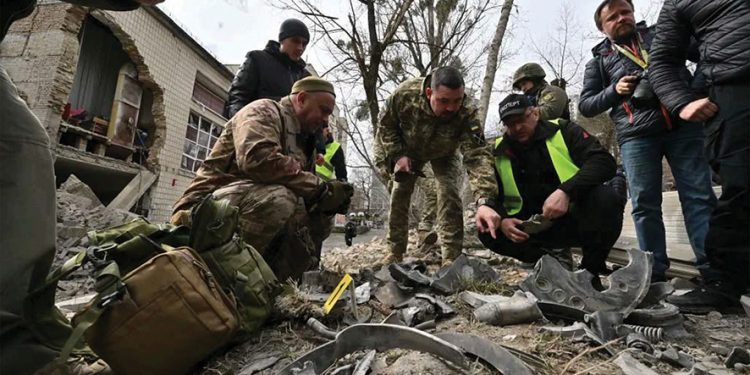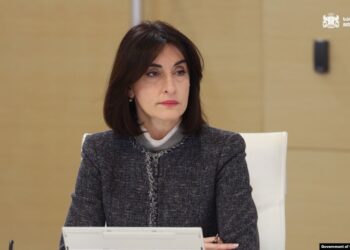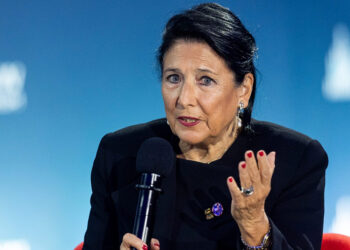There is no doubt that the West has fully realized the danger that the ongoing war in Ukraine poses to Western institutions and the system of international relations. It has realized it, but has not yet been able to fully reflect it in real actions.
After the sanctions-related, essentially world economic war I, the Western coalition resorted to a number of other measures to prevent Russian revisionism, ranging from political to military. Despite this, it seems that even today Russia is acting more purposefully to win in Ukraine than the West is to ensure that the Ukrainians win. The unprecedented consolidation of our partners and allies and those of Ukraine around a common agenda is beyond doubt. At the same time, it is also noticeable that this consolidation is not always reflected in timely and sufficient practical action. Thus, it is no surprise that the coalition is critically required to adapt adequately to the real needs of the war so that aid to Ukraine is not focused on its survival but on tangible success.
Another, more significant challenge that a prolonged war in Ukraine could exacerbate is the contradictory domestic political processes in the Western countries themselves: radical and populist trends are leading Western society towards isolationism. Added to this are factors (and sometimes phobias) such as fear of nuclear escalation with Russia, lack of mobilization resources to respond to the Ukraine crisis and other external crises, fluctuations in the world economy (including vulnerability of food and energy security), and information warfare.
We do not want it to be seen as ironic to assert that the war in Ukraine pushed the West out of its dormant state or “comfort zone” for nearly three decades after the collapse of the Soviet Union. The lessons of the Russian-Georgian war of 2008 and the annexation of Crimea in 2014 have been comprehended superficially, and the response to them has been insufficiently principled, too slow, too little. The impression was created that the West treated the countries bordering the Russian Federation strategically, but did so with insufficient conviction and in an insufficiently focused manner. As a result, the concept of so-called “strategic ambiguity” emerged in the Western doctrine, which implied activity without leaving the already mentioned “comfort zone”.
As we have already mentioned, February 24, 2022 made such a half-way geopolitics impossible. It became necessary to make principled, bold and convincing decisions. It became necessary, however… This is the “however” we very briefly explained above, and with the help of which Russian aggression in the neighborhood (so far – in the neighborhood) is actively trying to get geopolitical-geoeconomic dividends. One source recently noted that by a prolonged war in Ukraine we will achieve the separation of Russian society from Russian imperialism, which is equally debatable and possible. But given the existing internal and external contradictions, it is also questionable how ready the West is for a prolonged war. Therefore, for Ukraine’s partner countries, the imperative of rapid and full-scale mobilization of both military and political resources remains unshakable: it means the earliest possible end to the war with the most desirable outcome.
Proper navigation of the “war of narratives” is also important for the success of the West’s result-oriented policy in the war in Ukraine. In this respect, the assertion that Russia’s interest in the outcome of the war in Ukraine is greater than the West’s seems to be a classic example of disinformation. As trite as it may sound, we believe that this view has some basis in fact. At the same time, even more damaging is the discussion in certain media and expert groups where key priorities of the US and the EU are seen as competing with each other, such as: Ukraine or the Middle East or, say, Europe or the Indo-Pacific.
Any other, undesirable development of processes in Ukraine or failure in the war is not only Kyiv’s failure: on the one hand, it will be very harmful for the reputation of the Western political and security system, and on the other hand, it will strengthen revisionist and expansionist tendencies all over the world.
Let us recall the recent statement of William Burns, the Head of the US Central Intelligence Agency: “For the United States to walk away from the conflict at this crucial moment and cut off support to Ukraine would be an own goal of historic proportions” (Foreign Affairs, January 2024).
The Russian threat to post-Soviet countries, along with other stereotypes, was assessed by a very unusual criterion, especially by EU members. In particular, the reality of the threat was assessed based on: (a) the geographical distance of a country from Russia and (b) the intensity of business relations with Russia. It is clear how both circumstances influenced the perception of danger and the formulation of practical policies.
It is likely that these and some other stereotypes are to some extent still relevant today and continue to influence decision-making implicitly. However, after the “forced awakening” mentioned in this article, our partners should conclude that:
(1) The ongoing war in Ukraine will determine not only the future of countries in a geopolitical vacuum due to the collapse of the Soviet Union, but also the future of European and Euro-Atlantic unity; Furthermore,
(2) A prerequisite for this future prospect is to pool military and economic resources and turn them into a real deterrent force; as well as –
(3) It is one thing to meet the current needs of the Ukrainian resistance, and another to fulfill the corresponding tasks from a strategic point of view.
Among such tasks is to propose and implement an effective security mechanism for Ukraine (as well as for Georgia) immediately after the end of the war.
In this regard, several options are being considered in various circles, namely:
1) The so-called Israeli model, the brief essence of which is to arm Ukraine so that the country can defend itself independently:
It should be taken into account that such a security analogy is not accurate. The point is that, unlike the Ukrainian scenario, in the case of Israel: (a) the country has its own nuclear weapons as the main guarantor of the security of the Jewish state; (b) security and defense cooperation between the United States and Israel has been uninterrupted for more than fifty years, including the provision of state-of-the-art weapons; (c) the practice of Congressional support for Israel has become an unwritten rule; and (d) Israel plays a prominent role in the Middle East.
2) So called Individual security, i.e. such an option when Ukraine formalizes security and cooperation with one or another country within the framework of bilateral relations:
This mechanism is already working, and Ukraine has already signed bilateral cooperation with several countries. Obviously, this approach has positive sides, after all, this option is better than nothing at all, but the bilateral format has certain disadvantages compared to multilateral formats. These disadvantages are mainly related to a possible inability to attract sufficient resources and lack of the necessary political weight.
Moreover, it is noteworthy that, despite the frequent use of the word “guarantee” by Ukrainian official circles, the Western signatory partners are cautious in this part and remind us that we are actually talking about “commitments” rather than “guarantees”. Naturally, this caution has a political and legal explanation.
3) Security mechanism on the part of the Eropean Union:
It is probably one of the most ambiguous and uncertain security arrangements available globally. From this perspective, the European Union still has much to prove, both in terms of maintaining a Common Defense Policy and in terms of establishing the EU as a weighty and self-sufficient actor in matters of security and defense. It is worth mentioning that Article 42.7 of the Lisbon Agreement, which deals with common defense, has been invoked only once (in Paris in a famous terrorist attack in 2015) and is unlikely to serve as a solid precedent.
4) Membership in the North Atlantic Alliance:
The outcome of the Vilnius summit disappointed Kyiv. It is a fact that Ukraine had been waiting for an official invitation to join NATO and, in all likelihood, will expect the same at the next summit in Washington.
Given the current stage of the war and the world conjuncture, it is difficult to speak with certainty about the justification of this expectation. It is likely that the issue will be assessed again and again through the prism of traditional risks and internal processes of Western countries.
Here we will only briefly note that the invocation of NATO’s famous Article 5, on the condition that it is properly analyzed, does not mean that the alliance’s member states will automatically move into a mode of military confrontation with Russia. Moreover, on the basis of the same Article 5, in order to minimize risks, several practical recommendations have been made in recent years, first with regard to the occupied territories of Georgia and then of those of Ukraine. It is also a fact that the eastern flank of the alliance requires equal attention along its entire perimeter. And this requires that alliance’s member states also assess threats and risks uniformly, without a “transactional” conjuncture.
Georgian “policy of opportunities” in the context of the ongoing war
War is a disaster. War is a tragedy. War is immoral. Its vicious essence can be characterized by many other epithets. We will not say anything new here, nor will we tire the reader with a conversation devoid of practical content.
Now, in the final part of the article, we would like to outline some of the main issues: and this is along with the assessments made about the second anniversary of the war in Ukraine. These mentions are related to several rationales of the Georgian case which, against the background of the war in Ukraine, require our proper attention, assessment and action.
Russia’s large-scale aggression in Ukraine allows us to “return” or, if you like, to reopen the Georgian topic to the international agenda with new force and emphasis. Now already in the midst of providing even more realism to real politics and the aforementioned “forced awakening”. It sounds somewhat bitter, but we believe that the occupation and de facto annexation of Georgia, as well as the deserved positioning of our country in the security system, could not arouse due attention and empathy in recent years. Something more resonant, large-scale, even tectonic, should have happened. Russia’s renewed invasion of Ukraine and the events that followed created the preconditions for the reappearance of the Georgian problem in the international narrative.
We have mentioned several times in this article and will repeat at the end that the war in Ukraine has confronted the West with fundamental choices and essential decisions. We would also formulate the question as follows: will the created circumstances lead to the birth of a new West, one that will have the desire, the will and the ability to take the role of a leader in the real solution of problems? And this is relevant for Georgia insofar as it creates the basis for such proposals with our partners on issues of our own security and resilience, which were unimaginable to talk about and think about for many years. To put an end to the “geopolitical and strategic uncertainty” mentioned in the article, together with some aspects, it is time to take extraordinary measures, including the realization of guarantees of lasting and long-term security for Georgia.
The international political factors of the ongoing war require a rethinking of many fundamental questions of international law and order. Among them are the effectiveness of international institutions, humanitarian issues, effectiveness of sanctions, investigation of crimes according to international classification and punishment of criminals, realization of frozen assets, etc. These and other problems are not only academic but also practical for the Georgian side. While large and medium-sized countries can afford the luxury of deviating from international norms, small countries see the strength of these norms and adherence to them as an important protective barrier for their national interests.
In addition to changing the perception of modern military tactics and strategy, the war in Ukraine has had a serious impact on the global economic conjuncture. Therefore, the topic of conversation is vast, but now we will mention only one specific aspect, which is related to the supply-delivery channels that existed before the war (and before the pandemic). Of particular importance to us is the growing relevance of the Trans-Caspian International Transport Road project, also known as the Middle Corridor, which, in fact, was given a significant competitive advantage due to the increased riskiness of the Northern Corridor as a result of Russian aggression. Obviously, the realization of this historical project better demonstrates Georgia’s role (emphasizing its much-needed functional utility).
Any war falls under the category of crises. The world has entered an era of crises. Managing them and minimizing their harmful impact requires a constant and proactive response. For us, as a country with few resources in every possible sense, democratic resistance seems a relatively optimal form of response. This general phrase, of course, includes several specific components, whether it is the economics of crises, sound institutions, an inclusive political process, or a socially solidary society.
The war in Ukraine is probably not close to being over, nor is the balance of power in the system of international relations close to a new point of equilibrium. Therefore, both we and they, all of us, will have to talk to each other many more times to share our assessments, observations and conclusions.
By Victor Kipiani, Geocase Chairman














